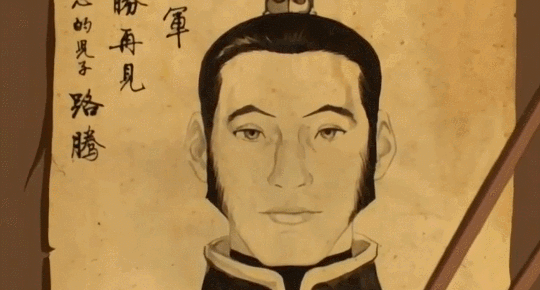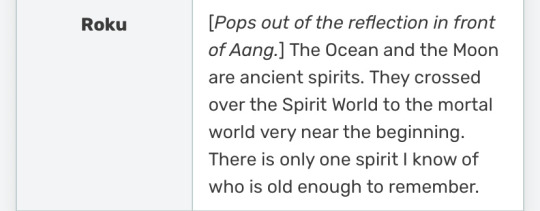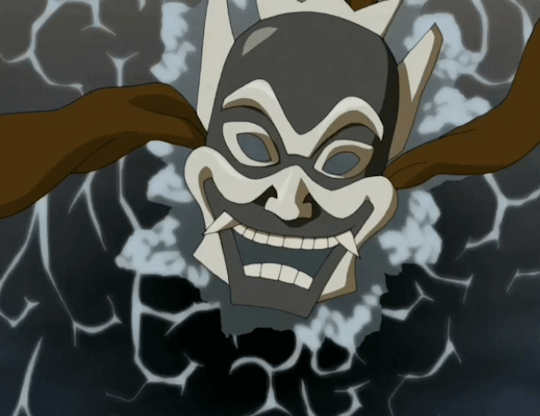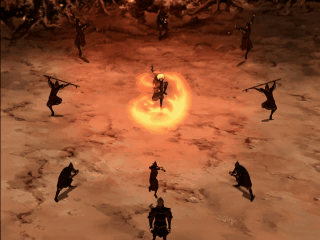#lu ten is zhao: i will not be saying sike at this time
Text
Lu Ten is Zhao; Zhao is Lu Ten
No, not in a gay way. I mean that literally.

What? Slander! The fandom cries, as I’m tied to a wooden stake and burned like an innocent woman in the Salem witch trials. Not on my good Christian Confucian(?) Minecraft Fire Nation server soldier!
Hear me out! 😩 This week broke me, but at least one good thing came out of it. I’m going to try to share my thinking process head-on, since there’s no possible way to render it in neat sections. But first:
WHOOPS: The theory is a bust if the AtLA timeline, crusher of hopes and dreams, is factored in. I realized little to none of the following matches up chronologically after I finished typing up the WHOLE thing, so... screw you, Jeong Jeong. Just sit back and enjoy it conceptually, yeah? Maybe I’ll get to crack open canon like a piñata another time. Anyways.
Or is it... UPDATE: I may have an additional explanation. Please keep reading! I saved it for the very end.
The spark was this: what if Lu Ten had never died, but was captured? Taken as a prisoner of war by the Dai Li, never to see daylight again, until he clawed his way out of their clutches and re-emerged from Ba Sing Se a deserted, cold, and detached man?
I pieced more of the story together as I thought of it from other angles, so that’s what I’ll do here. That’s right - I soldiered on like a doofus, digging around canon for feasibility.
From that spark, I remembered Zhao telling Iroh,
“I was a young lieutenant serving under General Xu in the Earth Kingdom.”
Which is apparently a phonetical playground, because aside from the Xu/Shu question, the first part of the sentence could also sound like,
“I was a young Lu Ten and serving under General Xu in the Earth Kingdom.”
Zhao clearly pursues a naval career, as his ranks ascend (backwards, but still sea-wise) from captain, to commander, to admiral of the Fire Navy. So it’s a bit of a head-scratcher to wonder how or why he served under a general, a distinctly land army title, in the Earth Kingdom near the Si Wong Desert - far from the coast, doubly far from water. Don’t throw his pheasant-squirrels quote at me just yet! A little head-scratcher goes a long way.
The Mother of Faces is singlehandedly the backbone of this theory. Her ability to alter identities and memories (keep in mind for later) is a pretty sound explanation for the Fire Nation failing to recognize their own revenant prince, chief among them his own father. And Zhao is regarded, in essence, as one of the only two Fire Nation men with decent spiritual knowledge. (You saw this coming from a mile away, but like father like son? 😉)
Another peculiarity is Zhao’s noticeable shift from suave and calculating in his first appearance to the rash, off-the-cuff hothead in... most episodes after “The Southern Air Temple”. Now pair this with Jet’s behavior after coming to the realization that something was very wrong after his soirée with the Dai Li, more or less aware his world was a tampered truth.

Panicked, angered, distrustful - a sharp change from the friendly tagalong helping the Gaang find Appa.
And speaking of sharp changes, these men side by side may barely resemble each other - hence the handy Mother of Faces card - but what if there’s a deeper study to Zhao’s sunken eyes, the hard lines around his mouth? As if he’s seen the kind of things you don’t retain all of yourself from... as if his features were once strained for prolonged periods of time, forced to hold a wide, Joo Dee PR smile?

(Be mindful of the wear and tear of trauma age!)
I should have peppered in disclaimers that I wasn’t high when I drummed this up... too late, I guess! 🤠
Drifting into speculations that hyped up this theory’s potential, consider the following:
Does this tie into the rate at which he’s promoted? Would that imply Ozai was aware of his nephew’s status, or that Lu Ten retained his charisma? This is rather important because it makes Zhao’s exact age difficult to determine, meaning he’s anywhere in the ballpark of Lu Ten’s generation to Ozai’s. Between those eyebags and those quick promotions, it’s free real estate.
Is the trauma dealt to him the reason he has an obsession with destroying one of the nations - out of vengeance? A desperate need to be remembered?
Does it offer an explanation for his immediate animosity towards Zuko, as if he thinks Iroh wasted no time replacing him?
Is it why Zhao is the only character on-screen who brews tea that Iroh doesn’t immediately reject? (Again, like father like son 😉)
Is it why he keeps knocking at Iroh’s door, trying to recruit him to serve at his general? Does he just want his frickin’ dad back? (Ow...)
Is that why Zhao listens to him at the North Pole when ordered to release the moon spirit, rather than the popular belief that Iroh scared him shitless? To be fair, could be both.
Is it why he snaps when he leans over the pond - a fairly-assumed magical pond, that is - like he’s seen his reflection in the spirit waters? His true face, as the deserted son?

Speaking of true faces... what about Noriko and the Blue Spirit? Did their encounters with the Mother of Faces coincide, or did Ursa’s come a few years after Lu Ten’s? She’s fond of theater, and the “Blue Spirit” in that context is the Water Spirit that battles the protagonist. Identifying Zuko’s mask for what it accurately was might have accelerated the search for him - was Zhao unable to disrespect it that way?

Last but not least. The introduction of Koh, the son of the Mother of Faces, in the same episode as Zhao’s last appearance. Maybe another hint Aang could have received was related to the admiral’s real identity? Canon is in its infancy here, so Roku’s failure to remember the Mother of Faces (hell, lion turtles too) when pointing Aang to a spirit “old enough to remember” is shaky grounds to theorize on. But still. It’d be very Koh-like for his mother’s efforts to slip his mind, or for him to intentionally wish Zhao dead.
One last interesting bit of canon: spirit doggos! The Mother of Faces only helps those chosen by her wolf companion, such as when Ikem found it (or it found Ikem) drinking from a pool in Forgetful Valley. Sure enough, lupine creatures also exist in Wan Shi Tong’s library: Knowledge Seekers which keep him up to date on the mortal world.
They’re not too similar in appearance, but a lightbulb should go off... ( ͡° ͜ʖ ͡°) Cousins twice-removed?

Extra Lenny face since I’m feelin’ like it: the Mother of Faces has a pretty clear plant-based structure, which the spirit library (admittedly only shown in LoK) seems to echo in its design. Maybe a leftover trace of her presence? She is a major spirit, credited with the beginnings of the world; easy to imagine the forest of Forgetful Valley itself rose in her footsteps’ wake. Plus, hardly any vine-like formations should crop up in the harsh climate of the Si Wong Desert.
( ͡° ͜ʖ ͡°)

So, ALL of that leads me to the complete narrative, a rough sketch of what became of Lu Ten as it exists in my head:
—
The prince is presumed slain at the six-hundred day siege of Ba Sing Se. His remains are never found. Iroh would almost prefer it that way, prays his ashes are carried away by the winds, and solemnly returns home.
Home is what Lu Ten dreams of for the next excruciating few years. Maybe it’s longer than he thinks, or even shorter - each moment stretched out to a thousand. It’s cold and miserable under Lake Laogai, and a city’s secret police force doesn’t take kindly to a two-year long siege. None is spared when the general’s own son is dragged into the endless maze of dark, winding corridors.
He hears his friends die. Sometimes he watches. Lu Ten always hears of it, one way or another. He can recall few days in the searing sunlight: another bumbling citizen, loyal servant to the Earth King, a guard who never marches out of rhythm.

When he crawls out into daylight, bloodied and irreparably scarred, he runs without looking back, with such aimless direction that the search for him is abandoned. He should turn up dead soon enough, and his memories are nonexistent - why bother?*
But if his years in captivity amount to anything, Lu Ten was a survivor. He races across the Earth Kingdom, keeping to the shadows, into the treacherous heat of the Si Wong - finally guided to the spirits. If his father’s journey into the spirit world in search of him had any role, the prince never finds out. He collapses after a much-needed drink, and witnesses a blurred, blue wolf carry him to refuge, where the Mother of Faces and the great owl greet him.
She tries her best to fashion a new face and mind, though the Dai Li’s scars are preserved in both: tired lines and blinding thoughts. Wan Shi Tong opens the library’s doors, pitying the years of knowledge stripped from him. The soldier leaves after recovering, repurposed from royalty into a man with no worth to his name except the scroll in his fist - Zhao.
Able to bend, and a cold shell of himself, content with that much of both. He leaves a wing of the library in flames. Prince Lu Ten had drowned in Lake Laogai, roamed the above world until another victim could take his place - the half-existence of the Shuî Guî. Now it was his turn to hunt.
In the years he struggles to rebuild, old scars resurface. General Xu’s troops find him a rambling madman, patch him up in the short time he serves on land, then ship him off to better uses in the navy. Zhao’s obscure story begins and ends with the scroll, and the man himself is repulsive, so he’s left to his devices. Deserted within a roiling mind, as dark and endless as the Dai Li’s fortress.
By the year the Firelord’s brother and son arrive at his harbor, he remembers enough to choose to take the truth with him to the grave. Zhao grows to hate their faces; when Iroh grows to hate him, too, he’s convinced it’s too late.
Fate is unkind, in the end. Instead of drowning the Water Tribe civilization, he’s dragged under the freezing current. The cycle folds in on itself, a Shuî Guî doomed to wander the Fog of Lost Souls. One day, a familiar face appears... regards him with sad, aged eyes... and turns away with a shake of his head.
“I came marching home...” He raises his voice across the fog, hoarse. “I searched, I fought, and I killed. For you!”
“... Then you are no son of mine.”
—
*I owe credit for the plot centered around one godawful Lake Laogai to the horror game I’m currently into. Outlast follows an investigative reporter as he records as much as he can of an insane asylum before making a break for it to expose to the world, so long as the asylum doesn’t swallow him up first. Truly gruesome. I put Lu Ten through the same :p
And, well, I wasn’t going to leave you hanging without tying the whole thing into the East-Asian mythos! Let me introduce the Shuî Guî, drowned ghosts that combine Zhao and Lu Ten’s fates into one symbolic shebang.

They begin as people who drowned without a proper burial, lurking around the body of water where it happened in search of a vessel. When a victim comes close enough, they’re dragged under themselves, and the spirit takes possession of their body - while the victim takes the place of the Shuî Guî. Rinse and repeat (ha).
Plugging in Lu Ten, the war prisoner who “drowns” under Lake Laogai, occupying Zhao’s form in spirit thanks to the Mother of Faces’ handiwork, there’s some great stuff to be done with it. Zhao’s ultimate fate at the hands of the ocean spirit doubles as a meaningful end to a soldier who chooses for himself, a last time. Maybe for the first time.
Don’t mind me freaking out over how many layers this adds to every Zhao interaction:
- “And General Iroh, great hero of our nation.” [Internally] ThisisforLuTenyoubigfatwhitenastysmellingfatbitchwhyyoutookmeoffthemotherfuckingschedule-
- “Do you have any ginseng tea? It’s my favorite.” Yeah, I remember, Pa. Unlike yOU
- Iroh: *flings him back twenty feet to protect Zuko* Zhao: X
- “So this is how the great Commander Zhao acts in defeat-” aT LEAST I DON’T ABANDON MY SON PA
- “Thanks again for the tea. It was delicious.” Zhao: X
- “I’ve heard rumors about your journey into the spirit world...” Too bad it wasn’t permanent, you geezer- wait you were trying to bring me back? O-oh... *sniffle*
- Zhao: But rest assured, this will be nothing like your legendary failure at Ba Sing Se. Iroh: I hope not, for your sake. Zhao: X
- [Internally, as his men are taken down at lightning-speed] OH GOD DAD’S MAD DAD’S MAD DAD DAD MAD RUN RUN RUN-
- “You’re the Blue Spirit, an enemy of the Fire Nation!” I’m just about fed up with your shit, cuz. Wait, where’d he go- AAAAAAH
- Zuko: Take my hand! Zhao: X
- ETC. TONS MORE. I can’t cover all of them in-depth 🥺
—
OKAY. NOW. THE TIMELINE.
Jeong Jeong is a little &@$;/! who couldn’t wait a few more years to desert but... whatever. I can fix the WHOOPS moment.
Lu Ten “dies” five years before the end of the Hundred Year War. Jeong Jeong deserts ten years before the end of the war. This twists the theory by having “Zhao” learn under Admiral Jeong Jeong almost eight years after the dude bailed.
So an area I planned to leave up to interpretation - whether the Mother of Faces assigned Lu Ten his new name, or for some reason, he chose “Zhao” himself - is one I’m going to snag for personal use.
Consider these three things, which I will then attempt to relate, slapping a big ol’ bandaid on this oopsie in the space-time continuum:
The tribe Jeong Jeong is seen residing with in “The Deserter” took him in after proclaiming he was a living god
Tu Shen, rabbit god of homosexuals
Sozin’s Law
🐇 Cool. Now check this:
Jeong Jeong never states his pupil’s name before Aang puts it together for himself and the audience. Lu Ten’s weakness could have easily been a lack of discipline, considering a) his father’s own tendency to joke about burning a city to the ground, b) a Fire Nation soldier’s drilled-in purpose to “spread greatness”, and c) “If only I could have helped you.”
It’s fitting that a name the prince would chose should do with war. While “Zhao” has no meaning I could find outside of a feudal state in the Warring States Period, the point stands. Warring’s in the name, maybe a chunk of AtLA history we aren’t privy to. Great! Onto the next thing: staying under the radar.
Sozin’s Law criminalizes same-sex relationships. This does not, by any means, dissuade a man like Jeong Jeong, and that’s a hill I’ll die on. I now declare AtLA’s version of Tu Shen, the Chinese deity who oversees queer affairs, to partly or wholly resemble the first deserter of the Fire Nation Army. The tribe in the northwestern Earth Kingdom are free-living gays who recognize their heavenly representative, and our buddy Chey is a very obvious simp. Tu Shen is also called the Rabbit God, which, if I had to draw two parallels off the top of my head between Jeong Jeong and the animal, would be a) fluffy white hair, and b) excellent at speeding out of sight.

Boom. Coincidental gay god of AtLA. Thank me later. Onto the last thing: Lu Ten is Hama but switch out the a’s with o’s.
He trains under Piandao just as Zuko did, followed by bending instruction under Piandao’s dear husband Jeong Jeong. The White Lotus has its connections, of course... ones Iroh might readily ping for teaching his son. When delicate, potentially incriminating matters threaten to come to light during Lu Ten’s unruly teenage years, Jeong Jeong urges them to switch to pseudonyms, resuming more anonymous instruction as the rumors lose traction. Works stupendously.
Lu Ten isn’t the first to find a safety net in using a separate identity: one among dozens accepted under Jeong Jeong’s wing, happy to continue their shadow lives like rabbits jumping to and fro out of the law’s sight! Zhao, he calls himself, proud of how it leaps off the tongue, daring as the slice of a sword. And when the Mother of Faces tells him to choose a new name, he knows exactly.
And Jeong Jeong, god of the gays, knows exactly who has returned from the dead to haunt them, knows exactly what to call that monster. Luckily, he also knows when secrets are better off as secrets. Seeing Zhao in the flesh only steels his belief that fire is destined to tear the bender apart.
Done!! Hopefully I... fixed it?
#i cannot believe this was such a wild ride#i almost became a jeong jeong hate blog#i don’t think the struggle to produce this in its entirety will ever be able to be described in words#it’s cheery then it’s sad then it’s a bump of cocaine then it just. ends.#oh my god#🌈🐇🌈#atla#atla theory#lu ten is zhao: i will not be saying sike at this time#zhao#admiral zhao#lu ten#luzhao#edit later we die like men
44 notes
·
View notes
Text
Wanted to stash this away for later, since I’m hooked on writing something from it... My clownery throws off the mood, so now we savor the angst like a hot cup of tea 😌

The prince is presumed slain at the six-hundred day siege of Ba Sing Se. His remains are never found. Iroh would almost prefer it that way, prays his ashes are carried away by the winds, and solemnly returns home.
Home is what Lu Ten dreams of for the next excruciating few years. Maybe it’s longer than that, or even shorter - each moment stretched out to a thousand. It’s cold and miserable under Lake Laogai, and a city’s secret police force doesn’t take kindly to a two-year long siege. None is spared when the general’s own son is dragged into the endless maze of dark, winding corridors.
He hears his friends die. Sometimes he watches. Lu Ten always hears of it, one way or another. He can recall few days in the searing sunlight: another bumbling citizen, loyal servant to the Earth King, a guard who never marches out of rhythm.
When he crawls out into daylight, bloodied and irreparably scarred, he runs without looking back, with such aimless direction that the search for him is abandoned. He should turn up dead soon enough, and his memories are nonexistent - why bother?
But if his years in captivity amount to anything, Lu Ten was a survivor. He races across the Earth Kingdom, keeping to the shadows, into the treacherous heat of the Si Wong - finally guided to the spirits. If his father’s journey into the Spirit World in search of him had any role, the prince never finds out. He collapses after a much-needed drink, and witnesses a blurred, blue wolf carry him to refuge, where the Mother of Faces and the great owl greet him.
She tries her best to fashion a new face and mind, though the Dai Li’s scars are preserved in both: tired lines and blinding thoughts. Wan Shi Tong opens the library’s doors, pitying the years of knowledge stripped from him. The soldier leaves after recovering, repurposed from royalty into a man with no worth to his name except the scroll in his fist - Zhao.
Able to bend, and a cold shell of himself, content with that much of both. He leaves a wing of the library in flames. Prince Lu Ten had drowned in Lake Laogai, roamed the above world until another victim could take his place - the half-existence of the Shuî Guî. Now it was his turn to hunt.
In the years he struggles to rebuild, old scars resurface. General Xu’s troops find him a rambling madman, patch him up in the short time he serves on land, then ship him off to better uses in the navy. Zhao’s obscure story begins and ends with the scroll, and the man himself is repulsive, so he’s left to his devices. Deserted within a roiling mind, as dark and endless as the Dai Li’s fortress.
By the year the Firelord’s brother and son arrive at his harbor, he remembers enough to choose to take the truth with him to the grave. Zhao grows to hate their faces; when Iroh grows to hate him, too, he’s convinced it’s too late.
Fate is unkind, in the end. Instead of drowning the Water Tribe civilization, he’s dragged under the freezing current. The cycle folds in on itself, a Shuî Guî doomed to wander the Fog of Lost Souls. One day, a familiar face appears... regards him with sad, aged eyes... and turns away with a shake of his head.
“I came marching home...” He raises his voice across the fog, hoarse. “I searched, I fought, and I killed. For you!”
“... Then you are no son of mine.”
#arguably this part is also pure clownery#but i’m too invested to come back down now#lu ten is zhao: i will not be saying sike at this time
1 note
·
View note